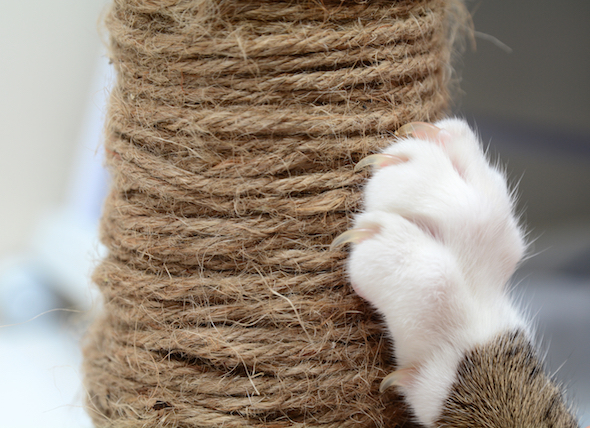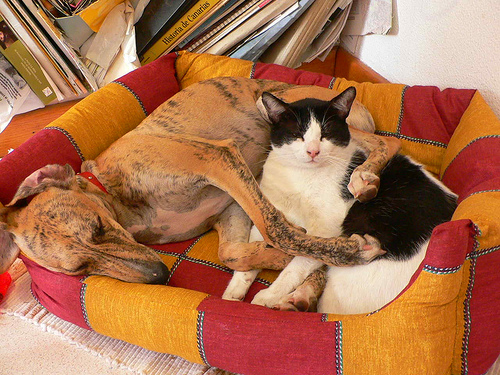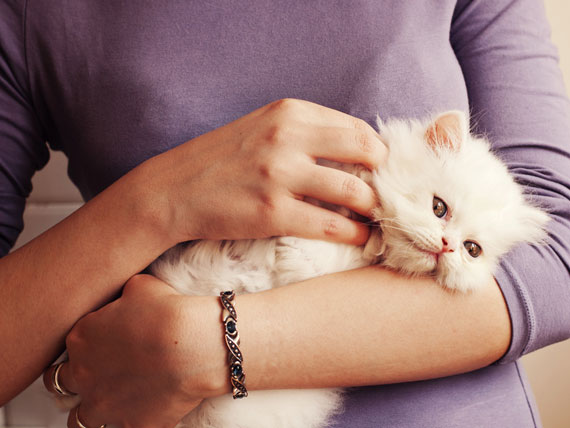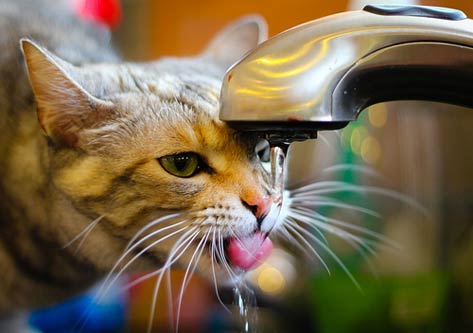If you realize your kitty is not feeling well it can be difficult because she isn't able to tell you her symptoms or precisely what she is feeling. Instead it's your responsibility to watch for any changes in routine or changes in behavior. This way you can be aware of any possible signs that your cat may be developing a feline illness.
It's important to know your cat's regular habits, things like regular eating and drinking habits, regular activity level, and regular litter box or "bathroom" habits. But it's good to keep in mind that with certain illnesses a cat might not show many symptoms; she might only have mild indications. This is why it's important to pay careful attention to your cat's regular behavior and be aware of even slight modifications. You may even want to take notes on the changes you notice.
Gathering this information about your cat's symptoms might also aid the veterinarian in diagnosing the cat illness. While sometimes the diagnosis for a cat health problem is determined quickly, other times it may be complicated and any additional information from you may be instrumental.
The more quickly you realize there may be something wrong the better. Starting treatment quickly can cut down on additional problems and provide a better success rate. Plus your kitty will start feeling better sooner. Another good reason to act fast is because certain feline illnesses can contribute to cat behavior problems like urinating or defecating outside of the litter box. This behavior can become an unpleasant cycle of problems so avoiding this behavior when at all possible is of course best for both you and your feline friend.
How do you know if your cat may have a feline health problem?
Sometimes it's more obvious than others, but as discussed earlier changes in your cat's normal behavior can be a good clue that something is wrong. There are also some specific symptoms to watch for:
- Urinating or defecating outside of the litter box
- Straining in the litter box
- Constipation (and lack of feces in the litter box)
- Diarrhea
- Changes in appetite
- Increase in thirst
- Change in weight
- Changes in energy level
- Depression or lethargy
- Vomiting (other than hairballs)
- Excessive scratching
These are only a few potential indications, but watch for anything out of the ordinary and discuss it with your veterinarian. Always consult your veterinarian if you think your cat has a feline illness -- don't try to self-diagnose. Feline illnesses can be complex and may require lab tests so you know how to treat it properly.
Preventing Feline Illness
As I'm sure you've heard before prevention is the best medicine. Naturally it is not possible to prevent all feline illness but you can at least help dilute the chances of it.
Diet is the foundation of your cat's health. Help keep your cat's immune system strong by feeding a nutritious, species-appropriate diet and make sure she always has access to fresh water. Cats need a lot of protein in their diet and it's best if their diet includes moist foods. In the long run feeding your cat a good quality cat food can actually save you money and headache.
Another way to cut the risk of feline illness is by keeping your cat inside. Indoor cats are less likely to contract a feline illness because they aren't as exposed to carriers of feline diseases or parasites.
And don't forget the routine vet visits.

 How to Keep a Cat From Scratching Furniture
By Stacia Friedman
Though it mig
How to Keep a Cat From Scratching Furniture
By Stacia Friedman
Though it mig
 Cats Are Different: How a Cat's Nutritional Needs are Different from a Dog's
Our wonderful life-supporting planet is h
Cats Are Different: How a Cat's Nutritional Needs are Different from a Dog's
Our wonderful life-supporting planet is h
 5 Steps to Success as a New Pet Parent
1. PET-PROOF YOUR HOME
Dogs and cats love to
5 Steps to Success as a New Pet Parent
1. PET-PROOF YOUR HOME
Dogs and cats love to
 Smart Shopping For Cat Food
What Should I Feed My Cat?
What
Smart Shopping For Cat Food
What Should I Feed My Cat?
What
 Kidney Failure in Cats
There are a variety of causes to kid
Kidney Failure in Cats
There are a variety of causes to kid